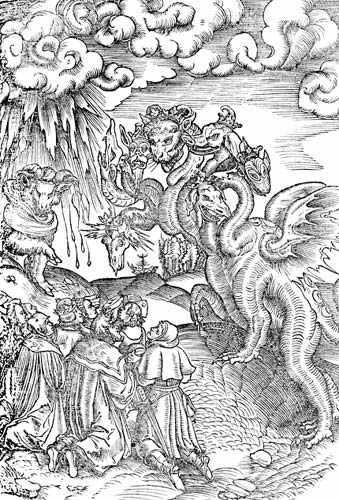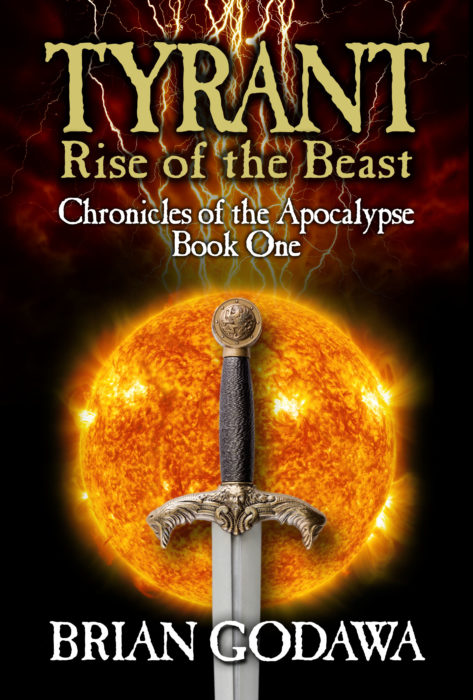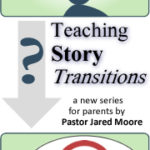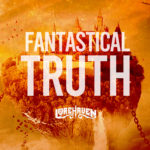The Book of Revelation is an Epic Horror Fantasy
I was recently given the honor of being interviewed by John Piper’s website regarding the horror genre, and in particular, the horror movie, It.
Putting it nicely, Piper’s followers are not very appreciative of the horror genre. So I was grateful that his staff decided my biblical arguments on behalf of both genre and movie worthy enough to post for a conversation. We have a long way to go, Christian horror lovers, but we will get there—because we have the Bible on our side!
Let me give the biggest example of that biblical support: The book of Revelation.
No matter what your interpretation of John’s visions of the apocalypse, everyone acknowledges that they are loaded with symbolism. In fact, in the very first verse, John tells us that the Revelation was “signified” to him (Rev 1:3). The ESV English translation says “made it known” to John, but the Greek is a word from which we derive our word for “semiotics,” the study of signs and symbols. Whether Revelation is about the past, the present or the future, its storytelling technique is certainly symbolic. It is describing the spiritual significance and scope that we do not see through fantastical images and poetic imagination.
My goal here is not to argue exactly what I think those images symbolize, but to talk about them as literature and genre. Let the epic horror fantasy begin!
I’ll skip the first chapters, because one through three are epistolary toward churches of Asia Minor. Chapters four and five are a vision of the heavenly throne room and Christ’s opening of the seven-sealed scroll.
And that’s when all horror breaks loose.
 Chapter six describes the seven seals being opened. Four horsemen of the apocalypse bring conquering, war, famine, and death upon the land like heavenly Nazgul. In fact, I wouldn’t be surprised if faithful Catholic, J.R.R. Tolkien, drew his fantasy imagery from these dark riders.
Chapter six describes the seven seals being opened. Four horsemen of the apocalypse bring conquering, war, famine, and death upon the land like heavenly Nazgul. In fact, I wouldn’t be surprised if faithful Catholic, J.R.R. Tolkien, drew his fantasy imagery from these dark riders.
The other seals are opened and we see images of cosmic collapse like something out of a global disaster movie like Geostorm (but with a much better story). The earth shakes, the sun goes dark, the moon turns to blood and the stars fall from the sky. I realize some people think this is literal, but this collapsing universe imagery has a long precedent in Scripture for being symbolic of the fall of earthly powers, from Babylon to Edom to Egypt to Israel (Isa 13:1-19; Isa 34:2-10; Ezek 32:7-11; Jer 4:23-30). These verses describe the same destruction of the heavens and earth as happening in the past. They had to be earthly symbols of spiritual significance because after all, we’re still here, aren’t we? Prophets were poets.
Then we come to the seven trumpets and bowls. Now, some scholars argue that the seven seals, seven trumpets, and seven bowls are not chronological, but simply a kind of literary cyclical technique called “recapitulation.” They replay the same judgments from different perspectives with new aspects illuminated about those events. Not everyone has this view, but it is a prominent one that makes sense of the literary structure and tempo of the text.
Then in chapter nine, we have the infamous locusts from the Abyss. These bizarre creatures are like genetic hybrids out of a Michael Crichton sci-fi fantasy: heads with human faces, women’s hair, teeth like lions’, breastplates of iron, tails and stings like scorpions (Rev 9:7-10). In earlier years, it was common to think of these unholy grasshoppers as an ancient way of describing Cobra helicopters in war. Some current prophecy pundits claim these are literal genetic hybrids created by modern scientific DNA CRISPR technology. Most likely, the locust creatures are an ancient symbolic way of describing the spiritual reality of demonic infestation through earthly metaphor, since they come from the Abyss, a biblical reference to the underworld (Psa 88:6), and their king is the demonic angel of destruction from that bottomless pit (Rev 9:11).
 Jumping to chapter 13 (and 17), we see the infamous sea beast. Like his symbolic precedent in the Old Testament, Leviathan, this sea dragon of chaos is another genetic hybrid of monsters destroying the land and people like Godzilla or other huge beasts in our Hollywood monster movies. It has seven heads. It is like a leopard, with bear’s feet and the mouth of a lion (Rev 13:1-3). Just imagining this fantastical monstrosity strikes fear into the reader’s heart, as any good fantasy horror should do. Why? Because it is symbolic of tyrannical earthly and heavenly powers. And it is the dragon that must be slain by the divine knight.
Jumping to chapter 13 (and 17), we see the infamous sea beast. Like his symbolic precedent in the Old Testament, Leviathan, this sea dragon of chaos is another genetic hybrid of monsters destroying the land and people like Godzilla or other huge beasts in our Hollywood monster movies. It has seven heads. It is like a leopard, with bear’s feet and the mouth of a lion (Rev 13:1-3). Just imagining this fantastical monstrosity strikes fear into the reader’s heart, as any good fantasy horror should do. Why? Because it is symbolic of tyrannical earthly and heavenly powers. And it is the dragon that must be slain by the divine knight.
This sea monster is both a symbol of a corporate empire (Rev 17:9-12) and an individual blasphemous ruler who demands worship and blasphemes God (Rev 13:18). Many scholars conclude that the sea beast has some kind of connection to the Roman empire (past or future) because of its description as symbolizing the seven mountains of Rome (Rev 17:9). And its heads represent seven kings of that kingdom of tyranny.
Then with some rather profane and vulgar symbolism, Revelation has a “great prostitute,” doing the dirty deed with kings of the land, and being exploited by merchants (Rev 18:3, 9, 11), before she rots with plague and is burned alive with fire (Rev 18:8). This is R-rated sexual slasher horror that is not family friendly or worthy of a Dove seal of approval.
The prostitute also rides the sea beast as a symbol of a corrupt immoral authority dressed in clothes that are drawn right from the description of Israel’s high priest’s adornment as well as the material used in the holy temple (Exod 25:4-5; 26:1; 28:5-8; 36-38). This is most likely a symbol of corrupt religious authorities spiritually influencing the Roman sea beast in her tyranny. But it is surely a disgusting picture of a rancid and diseased whore riding a beast of destruction. Parental discretion is advised.
No matter how you interpret these monstrous memes and metaphors, they remain a litany of horror images that use fantasy to conjure up the fearfulness and dread of the evil that God will judge. Huge and small genetically mutated monsters, possessed by demons, terrorize the land and murder people. The heavens and earth collapses like a Hollywood disaster movie. Rivers and seas of blood make Stephen King’s imagination look child-like.
Of course, there is a lot more than these few samples in Revelation. But the point is made that it is a literary masterpiece of epic horror fantasy. And it has influenced storytellers for the past two millennia. Christians who appreciate the horror genre or fantasy have much to delight in since they are God’s favorite genres when giving prophecy to his people (Revelation, Daniel, Isaiah, Jeremiah, Ezekiel, Amos, Micah). The horrific images of monsters and frightening terrors are one of the best ways to portray spiritual truths and encourage holy fear and righteous living.
I have tried to make some sense out of all that poetic and symbolic imagery in Revelation by writing a novel series about the origin story of the book of Revelation called Chronicles of the Apocalypse. I tell a fictional tale of the apostle John, Romans, Christians and Jews in the first century during the tyrannical reign of Nero as the Jewish War brought the armies of Rome down upon Israel. I put the apocalypse in its historical context, and try to capture how the ancient Jews and Christians understood its imagery in their own day. This ain’t your mother’s Left Behind.








































Interesting explanation of the book of Revelation, Brian. You’ve given me food for thought about a book I’m currently working on and which, I must admit, I’ve been holding back on the horror aspect of it. Thank you for the encouragement.
Lynne, I can’t speak for Brian, but I think the most important thing is to do what you are comfortable with. Scripture is clear, but when we write fiction, what should we include? Nobody can tell us. Sure we can think about our audience and perhaps what an agent or editor might want, but in the end, it really is up to us to include what we are OK saying.
I thought through this when I started writing my fantasy–much smaller scare, of course. My protag is in a profession not known for it’s clean speech. My guy is not a Christian starting out. Should I have him speak the way others might? I didn’t want that. So I found a way around it and I’ve never regretted it. Other people might handle it differently, but I had to feel OK with what I was writing.
I think that’s true for all of us.
Becky
Lynne, sorry, I did not see this early on. But, yeah, it’s amazing how we can see something we didn’t see with just a slight turn of perspective. I wrote an infamous article on the Biblical power of horror. I hope this can help: https://www.academia.edu/3794183/An_Apologetic_of_Horror